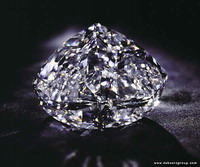Diamond traders to back Africa's efforts to cut and polish its own gemstones
De Beers Group called on diamond traders in Europe, the U.S. and Israel to back Africa's efforts to cut and polish its own gemstones.

The head of the South African miner - which controls 40 percent of the world's diamond trade - said it was not altruism to stabilize the diamond business by creating jobs in African democracies.
"We don't embrace this out of some misguided enthusiasm or altruism, we embrace it because it makes good business sense and because it's the right thing to do," he told a diamond industry conference in Antwerp.
People will not buy "conflict diamonds" stained with blood nor will miners invest the billions of dollars needed to extract them, he said.
"We need a strong and stable set of producing companies if we have to maximize future supply. Producing and selling diamonds today in or from a country in chaos or worse, in conflict, is simply not an option," Penny said.
Africa's natural resources have enriched traders across the world and Penny called on the gemstone business in Antwerp, Tel Aviv and New York to fund and help train the infant industry, mostly based in South Africa and Botswana - which owns 15 percent of De Beers.
"Without the traditional cutting centers, these new cutting centers will not succeed," he said, promising they would also gain from new opportunities.
Botswana mining ministry official Kago Moshashane said the country planned to create up to 3,000 jobs in the diamond processing industry.
But activist and former pop star Bob Geldof said countries like Botswana did not have time on their side to use their diamond wealth - which he said would last another 20 years - to train their people and develop their economy, making it crucial for Europe to change the system by dropping debt and ending unfair trade tariffs and subsidies now.
"In Africa, that's all there is: resource-based economies and you can't grow on that," he told an audience of mining executives, diamond traders and African officials. "Look at where they are now, subject to the prey of rapacious governments."
He said European and other leading industrialized nations had failed to turn promises into action while China buys access to mining rights in countries like once war-torn Angola. Poor governance in African countries was also to blame, he said.
"How can you come to power and not care about your people, Angola?" he asked Angolan officials in the audience. "How many of you benefit? A couple of hundred? The Chinese ask no questions and you're fixed there signing up to your Kimberley processes (certifying ethical diamonds). This has to stop. It doesn't work."
Antwerp, which once sparkled as the focus of the diamond cutting trade, has ceded its place to India's Mumbai which now cuts most of the world's diamonds, many of them less costly small stones. The port city that grew wealthy from Belgium's rule of the Congo is now an important focus for diamond trading and finance.
Antwerp World Diamond Centre's chief executive Freddy Hanard said Africa's desire to take more of the business did not pose a threat.
"If that contributes to greater wealth in Africa, I think we should certainly contribute. Antwerp has a lot of expertise and ... we can help them," he said.
Nor should the rise of Africa pose a problem for Asia, Penny said, because African countries will have to find their own market niche. They will need "vibrant low-cost cutting centers in India and China to process the volume of low-value rough which is simply not economic to cut in Africa."
The De Beers chief was upbeat about Africa's future, saying the company was spending more than US$100 million (71 million EUR) every year to seek new mines, "overwhelmingly in Africa and significantly in the Democratic Republic of Congo and in Angola."
Along with Sierra Leone and Liberia, oil-rich Angola is recovering from years of conflict that saw diamond wealth fuel the fighting, eventually leading to international efforts to outlaw the sale of illegally mined gemstones.
Subscribe to Pravda.Ru Telegram channel, Facebook, RSS!





